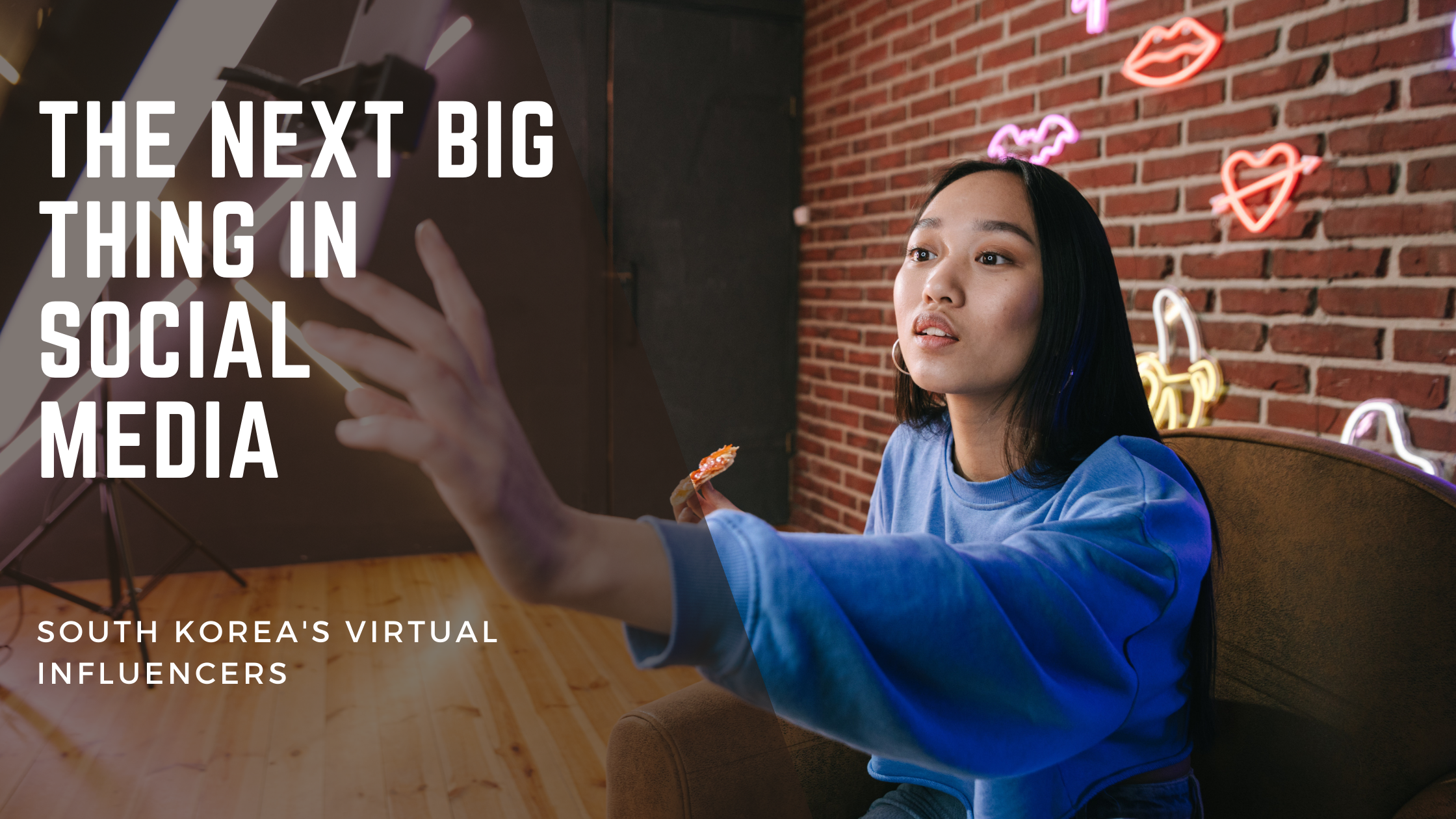The next big thing in social media is South Korea's virtual influencers
Social media has given rise to a new generation of celebrities: the influencer. With the power to reach hundreds of thousands of people with just a few taps on their phones, these men and women have built lucrative careers by promoting products, collaborating with brands and sharing their lives with their followers. But what happens when the influencer is not a real person? Meet Rozy, a virtual influencer from South Korea. Created by a team of designers, Rozy is a computer-generated avatar who has taken the social media world by storm. With her perfect skin, enviable wardrobe and a seemingly endless supply of energy, Rozy is the epitome of #goals. And since she doesn't age, she's also the perfect candidate for those coveted Forever 21 campaigns. While some people may see virtual influencers as CGI creations, I see them as living, breathing works of art. After all, it takes a lot of time, effort and talent to design an avatar that can convincingly mimic human behaviour. In a world where authenticity is increasingly valued, virtual influencers offer a refreshing alternative to traditional celebrities. Who knows? Maybe one day we'll all be following avatars on Instagram. Would you follow Rozy?
What is a social media virtual influencer?
She has almost 130,000 Instagram followers and photographs of her globe-trotting adventures on the platform. Her makeup is always perfect; her outfits appear to have come straight off the runway. She sings, dances, and models for a living - it's all performance.
Rozy is a "virtual influencer" from South Korea who has been mistaken for real flesh and blood since she was created digitally.v"Are you a real person?" one of her Instagram followers inquires. "Is it possible that you're an AI? Or are you a robot?"
Rozy is a combination of all three, she straddles the real and virtual worlds, according to the firm that created her. "She is able to do everything that humans are unable to accomplish in the most human-like manner," Sidus Studio X claims on its website.
Rozy has made millions for the firm in the multibillion-dollar advertising and entertainment industries since her debut in 2020. Rozy has appeared on runways in virtual fashion shows, landed brand deals and sponsorships, and even released two singles since her inception.
She's not the only one. The "virtual human" business is exploding and with it a whole new economy in which future influencers are never-ageing scandal-free and digitally flawless - alarming some in a nation already preoccupied with unattainable physical beauty standards.
How virtual influencers work
Rozy's CGI (computer-generated imagery) technology isn't new. It is common in today's entertainment industry, where actors use it to create realistic nonhuman characters in films, computer games, and music videos.
It has recently been used to create influencers, however. Sidus Studio X uses the technology to make a picture of Rozy from head to toe on occasion, which works well for her Instagram pictures. It also superimposes her head onto the body of a human model - for example, when she is modelling clothes.
Software designed for video games was used by South Korean retail company Lotte Home Shopping to create its virtual influencer, Lucy, who has 78,000 Instagram followers. Virtual influencers, like their real-life counterparts, gain popularity through social media by posting photos of their "lives" and interacting with their fans. Rozy's account shows her sightseeing in Singapore while her followers compliment her fashion choices.
Virtual influencers have struck a chord with younger Koreans, digital natives who spend a large portion of their time online. Experts say that virtual influencers have resonated with younger Koreans, digital natives who spend much of their lives online.
Lee Na-kyoung, a 23-year-old resident of Incheon, began following Rozy about two years ago believing she was a real person. Rozy responded to her postings and became her virtual friend; their relationship has endured even after Lee learned the truth. "We spoke like friends, and I felt at ease with her, so I don't think of her as an AI but a genuine buddy," Lee said. "I enjoy Rozy's material," Lee said. "She's so beautiful that I'm not sure if she's a human being or an artificial intelligence."
A profitable business
Virtual influencers can develop a following by utilizing social media, where the money is. Rozys Instagram feed is cluttered with sponsored material, in which she promotes skincare and fashion items. "Many large businesses in Korea want to follow Rozy's example," added Sidus Studio X's Baik Seung-yup. "We anticipate easily reaching over two billion Korean won ($1.52 million) in profit this year, just with Rozy."
According to Lee Bo-hyun, the director of Lotte Home Shopping's media business division, Lucy is expected to generate similar income this year because she has secured advertising deals from financial and construction firms. Lucy has attracted advertising offers from both sectors.
The designs are in high demand because they aid companies in reaching younger customers, according to experts. Rozy works with a life insurance firm and a bank, which are generally thought of as outdated. "However," said Baik, "after working with Rozy, their image has become very young." It also helps that these new stars are less maintenance-intensive than some of their actual-life counterparts.
It takes Lotte and Sidus Studio X between a few hours and a couple of days to make an image of their celebrities, while a video commercial takes anything from two days to several weeks to complete. That's far less time and effort than it takes to create a commercial with real people - where weeks or months may be spent location scouting and arranging logistics like lighting, hair, and makeup, wardrobe styling, catering, and post-production editing. When it came to choosing a virtual influencer, Lotte turned to Lee. When looking for ways to improve its "show hosts," the company looked at virtual influencers.
Lotte Home Shopping uses human hosts to promote items on television, but they "cost a lot," and "there will be changes when they age," Lee said. As a result, they created Lucy, who is "forever 29 years old." "Lucy is not limited by time or space. She may appear in any place at any time. And there are no moral issues involved," he continued.
A beauty question
Not only have South Korean celebrities embraced virtual influencers, but other countries have done the same. Lil Miquela, created by the co-founders of an American tech startup, has endorsed Calvin Klein and Prada and has more than 3 million Instagram followers; Lu of Magalu, created by a Brazilian retail firm with nearly 6 million Instagram followers; and FNMeka, a rapper developed by music company Factory New, who has almost 10 million TikTok followers are among the world's most famous virtual influencers.
There's one major difference, according to Lee Eun-hee, a professor at Inha University's Department of Consumer Science: virtual influencers in other countries tend to represent a wider range of ethnic backgrounds and beauty standards. Virtual humans elsewhere have "individuality," whereas "those in Korea are always made beautiful and attractive... (reflecting) the values of each country," she explained.
There are also concerns that virtual influencers might contribute to the development of unrealistic beauty standards in South Korea, which is often referred to as the "plastic surgery capital of the world" for its growing $10.7 billion industry. Younger Koreans, in particular women, have been resisting these values for some time. In recent years, a movement called "escaping the corset" has erupted.
Ideas of what is considered attractive in the country are limited; for women, this often means a tiny body with big eyes, a small face and pale, transparent skin. Furthermore, most of the country's virtual influencers have these characteristics; Lucy has flawless skin, long flowing hair, a slender jawline and a perky nose. Rozy has lush lips, long legs, and a flat tummy protruding beneath her crop tops.
Dr. Lee Eun-hee warned that virtual influencers like Rozy and Lucy may be making Korea's already tough beauty standards even more unrealistic, adding to the desire among women to copy them. "Real women want to resemble them, and men prefer dates with individuals who look similar," she added.
Rozy and Lucy's creators reject these criticisms. Lee Bo-Hyun, a Lotte representative, described how they attempted to make Lucy more than simply a "pretty picture" by creating an intricate backstory and personality. She got her degree in industrial design and works in the automobile industry. She talks about her job and interests on social media, such as her love of animals and kimbap - rice rolls wrapped in seaweed. In this manner, "Lucy is trying to have a positive influence on society," according to Lee, who added: "She's sending out a message urging people to 'do what you want to do based on your beliefs.'"
"Rozy isn't what anyone would call beautiful," said Cho, the CEO of Sidus Studio X. He noted her freckles and big eyes. "I made Rozy show that you can still be beautiful (even if you don't have a conventionally attractive face). "
Digital blackface
Concerns extend beyond Korean beauty standards. There is debate over the ethics of marketing goods to customers who don't realize the models aren't human, as well as the risk of cultural appropriation when developing influencers from a variety of ethnicities, which are termed "digital blackface" by some. Meta, which owns Facebook and Instagram, has acknowledged the dangers.
"Synthetic media, like any disruptive technology, has the potential for both benefit and harm. The issues of representation, cultural appropriation, and expressive liberty are already becoming a major concern," the company stated in a blog post. "To assist companies to navigate the ethical dilemmas of this new medium while avoiding traps, (Meta) is collaborating with partners on the development of an ethical framework to govern its usage."
However, it's clear that the sector is here to stay. As interest in the digital realm grows - ranging from metaverse and virtual reality technologies to cryptocurrencies - businesses predict that virtual influencers are the next area of growth for them.
Sidus Studio X has even grander goals in mind; Rozy will launch her own cosmetics line in August, as well as an NFT and a virtual pop trio to challenge the music charts. Many sports fans, according to Baik, are unable to meet actual celebrities in person since they only see them on screens. "There isn't much of a difference between virtual humans and the real-life celebrities they adore," he added.
"We want to transform people's ideas about virtual humans," Baik continued. "What we do isn't to eliminate jobs; it's to perform tasks that humans can't accomplish, such as working 24 hours a day or producing unique content such as walking in the air. We believe that in the future, people will be able to date or even marry virtual humans."
What do you think of this trend? Do you think it is something that will catch on in other countries? Let us know your thoughts in the comments below!




